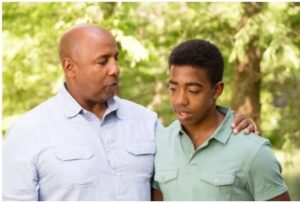Know the Risk Factors, Warning Signs of Suicide in Teens

This blog was originally published on July 28, 2017, and updated on September 21, 2023, to provide updated information.
Young people 10 to 24 years old account for 14% of all suicides and with more than 6,500 deaths each year, suicide is the third leading cause of death for teens. It’s critical for individuals to know the warning signs and risk factors to help prevent suicide and support those who are struggling.
While there is no single cause of suicide, a wide variety of factors can contribute to the risk of suicide attempts — including the stress a child or teen feels from their social environment, emotional pressures and family-related issues, the pressures of social media and so much more. Accordingly, openly discussing feelings with a loved one and understanding the issues related to suicide is a vital part of prevention. Let’s explore what you can do to keep teens in your care safe, the steps to take in a crisis and the key resources available for healing.
Why Teen Mental Health Concerns Are on the Rise
In recent years, a noticeable rise in teenage mental health concerns has occurred. During the decade leading up to the pandemic, feelings of persistent sadness and hopelessness, as well as suicidal thoughts and behaviors, increased by about 40% among young people.
With the intense growth and development adolescents experience, plus the isolation of the pandemic and increasing pressures from social media, it’s no wonder that the physical, emotional and social changes they go through can be immense all on their own. Add in the mounting academic pressures, negative social media influences, body image struggles, changing family dynamics and lack of coping strategies and you’ll find numerous reasons why teenage mental health can suffer.
Certainly, there’s also no discounting the collective trauma felt by the pandemic and how it’s affecting adolescents after the fact. As Brittany Broeckelman, Vice President of Clinical Services at Camber Children’s Mental Health, explains, “We experienced a lot of social isolation and overall disconnectedness which is very impactful on our mental health.”
Studies show that the link between restricted social isolation and the effects on adolescent brain development causes teens to suffer from lower mental well-being and negative feelings.
Meeting a Rising Need For Mental Health Support
Especially with numerous adults, teens and children still processing these events along with their own life struggles, there is an increased need for mental health care and not enough access — leading to the current mental health crisis we are facing.
“Kansas has seen a definite increase in suicide attempts, which has led to an almost 69% increase in emergency department visits,” Broeckelman notes.
This more recent increase is understandably overwhelming and is fueling the need for additional support.
In response to the increasing demand for adolescent mental health care, Camber opened a new acute mental health center in Hays, KS to serve the more rural children and families of the community. Additionally, the new wellness campus is now under construction, which will provide 72 beds, 48 of which are specifically designed for children’s mental health needs. As community resources are working to meet the demand, caregivers can help by providing support, assistance and intervention, if necessary.
Understanding Normal Adolescent Changes vs. Changes that Need Professional Intervention
The adolescent years can be an exciting but challenging time. As anyone who knows a teen can attest, countless physical, mental and social developments and changes are made. And with emotions and behaviors changing at such a rapid pace, it can be difficult for caregivers to keep up. Therefore, it’s important to understand the difference between the more normal adolescent mood swings. Some changes in mood are typical for teenage brain development. However, some shifts might be signs that professional help could be valuable.
What should caregivers watch for? Here are some risks and warning signs of suicide and other mental health challenges.
Risk Factors for Suicide
- Family history of suicide
- Exposure to traumatic experiences like family violence or physical and/or sexual abuse
- Loss of someone close
- Experiencing bullying
- Family history of mental illness, depression, alcohol and/or drug abuse
- Chronic pain and certain medical conditions
- Previous suicide attempts or ideation
- Diagnosis of depression, bipolar or anxiety
- Substance use or an increase in substance use
Warning Signs of Suicide in Teens
- Talking about suicide, wanting to kill themselves or die
- Feelings of hopelessness
- Increase in feelings of anxiousness, anger or rage
- Extreme mood changes
- Interacting with a different social circle than normal
- Increased alcohol and/or drug abuse
- Disinterest and withdrawal from family, friends and/or activities
- Changes in sleeping and/or eating habits
- Feeling trapped or in unbearable pain
Steps for Caregivers to Take If Warning Signs are Noticed
Recognizing that something distressing is happening to a child or teen can be disheartening and overwhelming. If you’ve noticed a difference in behaviors and at least one or two warning signs are present, it’s time to respond safely and effectively. Seek professional help as soon as possible by contacting Camber Children’s Mental Health at (913) 890-7468.
If you or your child are experiencing an immediate emergency, call 911. Another option is to call the National Suicide Prevention Lifeline at its new 988 number.
Next Steps:
- Understand the warning signs of suicide. Staying involved with your child or teen’s life will help you determine if a serious problem arises and to take action as soon as possible.

- Respond and engage. It is a myth that talking to a child or teen about suicide makes them more likely to pursue it. Research shows that talking openly creates a safe environment to express feelings and thoughts that might have been kept secret, which leads to intervention. Listen without judgment and make them feel heard and understood. Then guide them to professional help to start the healing.
- Contact mental health professionals. Know where the resources in your community are located and what services they offer. Learn about the Camber locations and acute/inpatient and residential psychiatric treatment services, and get an assessment to find which level of services is best for your teen’s situation. You can talk with a member of our team 24 hours a day, 7 days a week by calling (913) 890-7468.
- Engage in your own mental health needs. Pay attention and prioritize your own mental health care to set an example for your child. Meanwhile, this can create a connection and reinforce the importance of mental health treatment.
- Develop a supportive community. Make a list of friends and family who can listen openly to the issues and stresses your child or teen may be facing. Consequently, your teen will understand that they have a network of people willing to come alongside them during difficult seasons.
Suicide in Teens: Helpful Resources
If a teen in your care is struggling, it’s important to know that you’re not alone and there is hope. Here are some valuable resources to help provide the best care.
- Inpatient and residential psychiatric treatment services are available to youth ages 6-18 in three Camber locations in Kansas: Kansas City, Wichita and Hays. Additionally, KVC Health System offers a wide variety of outpatient services in locations across Kansas, Missouri, Nebraska, West Virginia and Kentucky.
- SAMHSA Mental Health Services Locator
- Centers for Disease Control and Prevention
- Suicide Prevention Resource Center
- American Foundation for Suicide Prevention
As always, Camber Children’s Mental Health is here to help you navigate any mental health needs a child in your care may face. We have children’s mental health hospitals and residential treatment facilities in Kansas City, Wichita and Hays. We are available by phone 24/7 to answer any questions you have or to begin the admission process. Our lifesaving interventions have been helping youth achieve mental health wellness for over 30 years.
Get in touch with our admissions team at this form or give us a call today:







